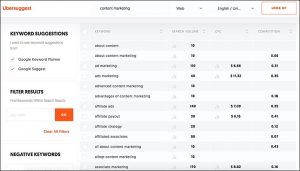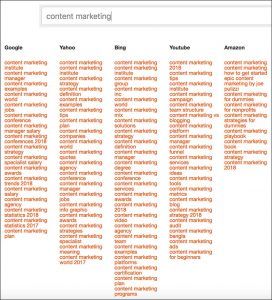Keyword research is an integral part of any search engine optimization strategy – and it doesn’t have to cost a fortune.
Keyword research takes up a significant chunk of time, and this is the case for many marketers, website owners and content creators. But it is something that has been expanding outward toward small and medium business owners as well, as having a fully optimized website is a necessity in running a company with any kind of online presence.
In the past, it was a matter of putting in the leg work – often for hours a day – to find the best keyword strategy. Today it is much simpler as more tools have been developed to make the job much faster and easier than ever before. Unfortunately, many of those tools are costly and over budget for anyone but enterprise level brands.
To keep things more affordable you can use alternative tools – often several to compensate – that are low cost, or even completely free. Here are some keyword research tools that you won’t believe don’t cost a cent.
Ubersuggest
Ubersuggest can be used for both content research (and to help surpass any idea blocks) and keyword research tool. By entering a phrase or keyword, choosing the medium (i.e. web, images, Yahoo) and language preference, the platform will give you a list of related searches, along with search volume, CPC, and rate of competition by percentage.
For example, searching for “content marketing” gives 913 results with an overall volume of 18,100, a CPC of $23.25, and a competition rate of 0.58. Scrolling down gives you a breakdown of all the variants and how that changes, such as “affiliate ads” having a volume of 140, CPC of $4.70, and a competition rate of 0.36.
The tool requires no login and, unlike Keyword Planner (which shows a range), it shows the actual search volume and competition level.
Google Correlate
Everyone knows about Google Keyword Planner and probably uses it, as it is the most accurate keyword tool on the web if your aim is to target Google search.
However, you may not have heard about Google Correlate, which is a very helpful and effective tool that works by taking searches and correlating them with trends happening both on the web and out in the real world. It establishes patterns that you might have never realized existed, and even lets you compare based on time period – both long and short term.
Keyword.Guru
Do you want to know what is popular on all major search engines, and not just Google? Keyword.Guru is a great tool that takes live searches and lets you know the moment you start typing what suggestions it has, so you can see what people are searching for at any given time.
There aren’t any real metrics, but not everyone likes to deal with numbers. This tool is less technical than some, but more accessible if you just want to see what searches are most common without all the associated information, which can be overwhelming to even seasoned keyword researchers.
Soovle
Google, Bing, Yahoo, Amazon, Wikipedia, and YouTube: what do they have in common? Soovle covers all of them, which makes it easier to get a good grasp of what is going on through multiple channels.
Being able to search YouTube for video content, Wikipedia for educational articles, and Amazon for sales info is especially helpful for getting a broader glimpse of the current state of search on the web. Soovle doesn’t generate any numbers for each keyword, but lets you quickly get a general idea of what interests your audience across a range of channels.
Akin to Keyword.Guru, it does it on the same page and with live search updates.
Bulk Keyword Suggest Tool
Bulk Keyword Suggest Tool allows you to dig into auto-suggest results from Bing, Amazon and YouTube. It was created by SEOchat and uses core terms to build a wider circle of phrases for use.
It is simple to use, easy to read and very fast to search. You can run a second or third bulk suggest and compare, then export your results or only specific ones based on how you click.
Bonus: Awesome freemium tools
Serpstat
Serpstat is a growth-hacking tool, and an effective at that. It has paid versions starting at $19 per month, allowing you to graduate to new levels as your business grows. However, there is also a free version that works with different iterations of Google based on country.
Serpstat calculates keyword difficulty for each search query, shows “special elements” (which inform us on search intent) and social media domains ranking for each term, and offers advanced filters to dig deep into each keyword list. It is also one of the few tools that also works on Yandex.
The graphs that are generated are simple bar graphs that effectively break things down and make it easy to understand at a glance.
WordStream
WordStream has a freemium model and its full featured tool is around $260 per month with a discount option to pay annually. However, it also has a free, limited version that I like to use because it allows you to specify industry if you wish.
That makes it a little bit easier if the key phrase you are working with it more general and could apply to unrelated fields. You can also specify based on country, which is great if you don’t want to automatically target a US audience (something that many tools do since it is the largest Google market).
Do you have a tool you feel deserves to be on this list? Let us know in the comments.
source https://searchenginewatch.com/2018/05/01/the-best-alternative-keyword-research-tools/







No comments:
Post a Comment